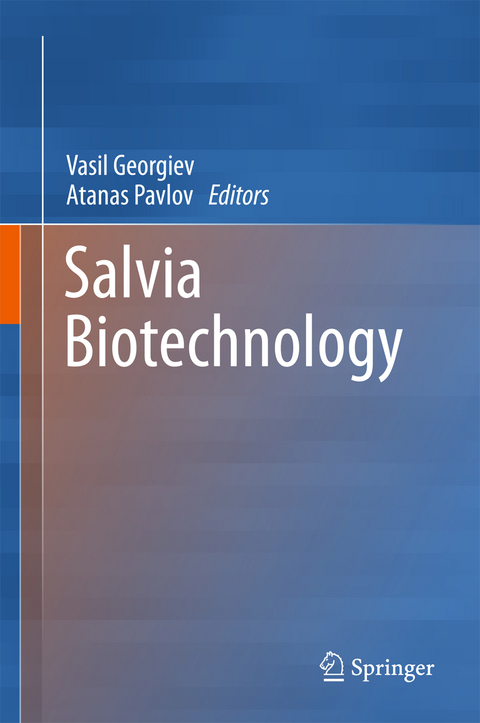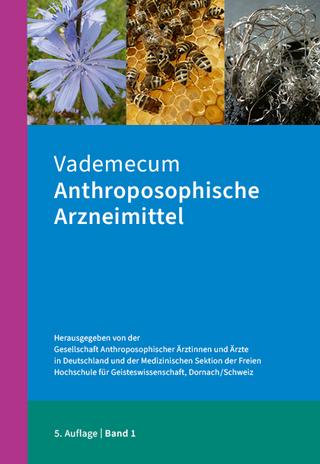
Salvia Biotechnology
Springer International Publishing (Verlag)
978-3-319-73899-4 (ISBN)
With the advances in phytochemistry and pharmacology, terpenes, polyphenols and volatile compounds have been recognized as the source of bioactivity in Salvia extracts. Nowadays, because of their valuable pharmaceutical and nutraceutical properties, many Salvia species have been widely used as ingredients in food, pharmacy and cosmetic industries. The economic importance of Salvia plants continues to increase, following closely the growing interest to the concept for modern healthy lifestyle, based on prevention by consuming quality foods and nutraceutical supplements of natural origin.
However, the growing demand has led to overexploitation of natural habitats and in the last few years many wild growing Salvia species have shrunk or fallen under threat. Obviously, to deal with that problem and to prevent ecological crisis, there is an urgent need for alternative, renewable sources of Salvia biomass. Plant biotechnology can provide a wide range of tools for development of economically feasible continuous production of standardized valuable phytochemicals. Plant in vitro culture technology is a powerful method for continuous production of plant secondary metabolites under controlled conditions, recently adapted to various Salvia species. Salvia in vitro systems are harmless to natural plant populations and can be grown independently of environmental factors, geographical latitude, climatic change, and seasonal variations. Several bioactive metabolites from rare and endangered Salvia plants can be produced by employing different plant in vitro systems.
However, the researches on development of large scale biotechnology, based on Salvia in vitro systems, are still in early stages and many points still have to be addressed before the commercialization to take place.
In this book we intend to summarize the recent achievements in research with Salvia in vitro systems as biological matrixes for the production of pharmaceutically important secondary metabolites. Further we invited leading experts to present their recent studies on phytochemistry, ethnobotanical and ethnophamacological aspects of genus Salvia . Safety and legal issues related to implementation of Salvia plants and in vitro cultures extracts in foods, cosmetics and pharmaceutical products will be discussed as well.
Dr. Vasil Georgiev obtained his PhD at The Stephan Angeloff Institute of Microbiology - Bulgarian Academy of Sciences in 2009. He is an expert on bioprocess engineering and secondary metabolites production by plant cells, tissue and organ cultures, functional genomics, metabolite profiling, development and improvement of plant in vitro production platforms. In 2011 he was awarded by the Bulgarian Academy of Sciences with the "Prof. Marin Drinov" prize for the outstanding research in biological sciences. Dr. Georgiev did postdoctoral research at Florida A&M University, USA (2012-2016). Since 2016, he is Associate Professor in the Laboratory of Applied Biotechnology at The Stephan Angeloff Institute of Microbiology - BAS and also joined the Department of Organic Chemistry at the University of Food Technologies, Plovdiv, Bulgaria Prof. Atanas Pavlov completed his PhD in biotechnology at the Stephan Angeloff Institute of Microbiology, Bulgarian Academy of Sciences in 1998. From 2003 to 2005, he did postdoctoral research at the Institute of Food Technologies and Bioprocess Engineering, University of Technologies, Dresden, Germany. In 2005, he joined The Stephan Angeloff Institute of Microbiology, Bulgarian Academy of Sciences as an Associate Professor. In 2009, he received his habilitation (DSci) and is since 2010 a Professor at the Laboratory of Applied Biotechnology. Since 2011 he also holds a second Professor position at the University of Food Technologies on Plovdiv, Bulgaria. His research is mainly focused on the production of specific bioactive metabolites by plant cell, tissue and organ cultures.
PART
I - SALVIA SPP. AS MEDICINA
L AN
D AROMAT
IC PLANTS
1. Salvia spp: An updated on antioxidant activity and pharmacological uses" - Dr. Maria Porres-Martinez, (Complutense University of Madrid, Spain)
2. "European species of genus Salvia: secondary metabolites, pharmacological properties and biological activity" - Dr. Milena Nikolova and Dr. Ina Aneva, (Institute of Biodiversity and Ecosystem Research-BAS, Bulgaria)
3. "Chia - Tiny, but mighty" - Prof. Ram Rajasekharan and Malathi Srinivasan, (CSIR-Central Food Technological Research Institute, India)
4. "Composition of volatile compounds in Salvia sp., grown in Bulgaria and their biological activities" - T. Atanasova, P. Merdzhanov, A.
M rchev,
V. Gochev, A. Pavlov, P. Bozov, A. Stoyanova, (University of Food technology, Bulgaria)
5. Screening of Salvia leaves surface microflora for lactobacteria with potential application in development of new high-quality functional dairy products. - Prof. Dora Beshkova, (The Stephan Angeloff Institute of Microbiology-BAS, Bulgaria)PART
II - PHARMACOLOGICA
L PROPERTIES OF SALVIA SSP.
6. "Anticancer activity of Salvia miltiorrhiza" - Prof. Thomas Efferth, (Institute of Pharmacy and Biochemistry, Johannes Gutenberg University, Mainz, Germany)
7. "Salvia divinorum a psychoactive plant with pharmacological potential" - Prof. Jordan Zjawiony, (University of Mississippi , USA)
8. "Bioactive Constituents of Anatolian Salvia Species" - Prof. Gülaçti Topçu, (Bezmialem Vakif University, Turkey)PART
III - BIOPROCESSING OF SALVIA IN VITRO SYSTEMS.
9. "Salvia cell culture: a terrific factory of bioactive compounds" - Dr. Teresa Docimo, (Institute of Biosciences and Bioresources, Italian National Council of Research, Portici, Italy)
10. "Optimization of the production of rosmarinic acid in Salvia officinalis and Salvia dolomitica cell biomass with several biotechnological approaches" - Prof. Barbara Ruffoni, Laura Pistelli, Luisa Pistelli and Laura Bassolino, (CREA - Unità di ricerca per la Floricoltura e le Specie Ornamentali, Italy)
11. "Bioactivities of differentiated Salvia in vitro cultures" - under correspondence
12. "Micropropagation of African Salvia species"- prof. Nokwanda Makunga (Stellenbosch University, South Africa)PART
IV - METABO
LIC ENGINEERING AN
D FUNCTIONA
L GENOMICS OF SALVIA SSP.
13. "Molecular Markers in Salvia: Past, Present and Future" - Prof. Mehmet Karaca and Dr. Ayse Gul Ince, (AkdenizUniversity, Turkey)
14. "Genetic engineering and manipulation of metabolite pathways in Salvia plants"- under correspondence
| Erscheinungsdatum | 19.04.2018 |
|---|---|
| Zusatzinfo | Approx. 330 p. |
| Verlagsort | Cham |
| Sprache | englisch |
| Maße | 155 x 235 mm |
| Gewicht | 856 g |
| Einbandart | gebunden |
| Themenwelt | Medizin / Pharmazie ► Naturheilkunde ► Phytotherapie |
| Medizin / Pharmazie ► Pharmazie | |
| Medizin / Pharmazie ► Physiotherapie / Ergotherapie ► Orthopädie | |
| Naturwissenschaften ► Biologie ► Botanik | |
| Naturwissenschaften ► Biologie ► Genetik / Molekularbiologie | |
| Technik ► Umwelttechnik / Biotechnologie | |
| Schlagworte | Bioactive Compounds • Bioprocessing • functional genomics • Metabolic Engineering • Pharmacological properties • Salvia ssp. |
| ISBN-10 | 3-319-73899-2 / 3319738992 |
| ISBN-13 | 978-3-319-73899-4 / 9783319738994 |
| Zustand | Neuware |
| Informationen gemäß Produktsicherheitsverordnung (GPSR) | |
| Haben Sie eine Frage zum Produkt? |
aus dem Bereich


